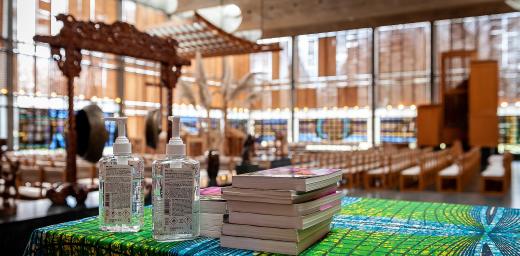Care for Natural Resources and Community Livelihoods in Nicaragua
ILFE youth members Freidys Velazquez (right) and Alejandra López. Photo: ILFE/Chelcea Macek
Lutheran Church “Green Project” Improves Food Security and Economic Opportunities for Rural Families
EL RODEITO, Nicaragua/GENEVA, 4 October 2013 (LWI) - Freidys Velazquez, a shy teen from El Rodeito, Nicaragua, a small, community deep in the mountains without electricity or potable water, smiles when she talks about the future.
“My goals are to live better, help my community live better, and fight to protect our environment,” says Velazquez, whose parents are both Lutheran pastors. “The church has helped me learn a lot.”
Through its so-called “Green Project,” the Nicaraguan Lutheran Church of Faith and Hope (ILFE) works in El Rodeito to help community members improve their lives by establishing family gardens, building communal water wells and constructing latrines.
The project’s goal is to strengthen the capacities of church members to live better by promoting sustainable management of natural resources through alternative environmental methods.
The church hopes to nurture organic agriculture and the use of corresponding technologies in its faith communities.
The Green Project involves several rural communities in the Central American country. It has established a farm learning center that uses new techniques for planting, and implemented solar energy and environmental education programs.
The ILFE project also offers opportunities to learn about forest management, fruit tree nurseries, soil conservation, sustainable cooking methods, irrigation systems and horticulture.
The church’s director of diakonia, Angel Aragon, says the project, which was started in August 2011, has been a great success.
“We have made progress in transforming the reality of farm life here in Nicaragua and are helping to develop synergy within communities where we work,” he says.
Education Programs on Climate Change
Aragon speaks proudly of the project’s education programs on climate change, establishment of tree nurseries, production of fruit and forest plants, management of local resources, and cultivation of papaya, coffee and bananas.
”These families are benefiting in ways that are very important to them. The Green Project is allowing them to make a change in their living standards and local practices,” Aragon adds.
“As a church we are fulfilling our mission; we are responding to our communities and we are responding to our brothers and sisters around the world whose prayers and financial support make these projects possible,” he notes.
Velazquez mentions her experience in a communal garden in El Rodeito, where five families from the local church work together on a large family garden.
“Everyone helps maintain the garden by going every afternoon to help water and weed the plants. Right now we have different types of squash, mangoes and oranges.”
Families also receive fruit trees and vegetable seeds to plant at home to assist in diversifying their diets with more nutritious foods, “Instead of eating corn bought in the market, we eat our home-grown bananas and yucca (cassava). Now we have the fruits and vegetables we need here at home, our diets have greatly improved and our families are healthier,” Velazquez says.
She stresses the importance of growing one’s own crops in Nicaragua. “Before, all of the fruits and vegetables we bought in the market were grown with agrochemicals. We’ve learned through the classes at the Green Project the dangers of using chemical pesticides,” she says. “Now that we are growing our own food, we have control, and everything is grown organically.”
The economic situation of families has also improved. “If we are able to harvest a lot of produce from the garden, we can sell the extra vegetables to community members to help our families make money,” adds Velazquez.
Improved Hygiene and Health
She recalls a time when it was very difficult to acquire water in her community. “The well was not working correctly. It was also being contaminated because people didn’t understand the dangers of human waste being dumped nearby our water source.”
The Lutheran church assisted the community to obtaining materials to construct a safe, accessible well. “The new well assures us that clean water is almost always available.”
Lack of proper disposal of human waste is a key cause of illness in rural Nicaragua. A latrine project is also underway to make El Rodeito homes more hygienic and healthy.
“Right now we do not have any latrines in our community,” Velazquez says. “This project will greatly help better the people’s health.”
Deforestation and forest burning in Nicaragua has resulted in crops drying up more than ever before, while the rains have diminished. “We have to keep planting trees and working together as a community or we will soon have no resources left.”
A Growing Church
The Green Project’s programs have led to open conversations between members of the church and others in the community. Velazquez, whose parents conduct services at home, says the church is growing, with youth joining every day.
“Sometimes we can have over 50 people in our home, participating in worship. Watching the church grow, just as our gardens do, it really is something very special,” Velazquez concludes.
The El Rodeito community is one of the congregations of ILFE’s 44 congregations in Nicaragua. There are an estimated of 36 pastors and 60 lay leaders serving the 9,600 -member church.
The Green Project, together with the “Food Security Project in Somotillo” encourages ILFE members to live their faith actively by caring for God’s creation, says Rev. Dr Patricia Cuyatti, area secretary for Latin America and the Caribbean at The Lutheran World Federation (LWF).
“Through the involvement of young people, the projects promote approaches that help communities relate to the environment in responsible ways. The diverse experiences from the projects offer the Lutheran communion space for sharing and learning, and a good opportunity for cross-regional empowerment,” she adds.
The Nicaraguan Lutheran Church of Faith and Hope joined the LWF in 1994.
(Contributed by Chelsea Macek, Managua, Nicaragua)





